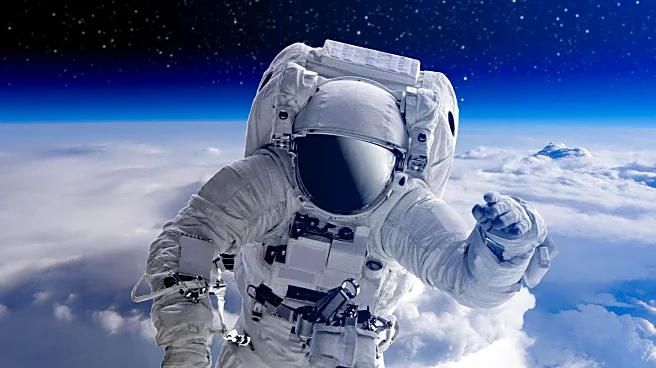What's Happening?
Astronaut Jim Lovell, known for his role in the Apollo 13 mission, shared his reflections on Earth's exceptional qualities during a conversation in 2017. Lovell, alongside his wife Marilyn and their dog Toby, emphasized the beauty and uniqueness of Earth, describing it as 'paradise.' He highlighted the profound impact of the 'Earthrise' photo taken by his Apollo 8 crewmate, William Anders, which offered a new perspective on Earth's grandeur. Lovell's experiences in space, where he encountered the starkness of the moon's environment, reinforced his appreciation for Earth's natural elements. He expressed a belief that humans experience 'heaven' on Earth, urging the importance of preserving its resources and recognizing its 'carrying capacity.' Lovell's insights underscore a deep connection to and responsibility for the planet.
Why It's Important?
Lovell's reflections are significant as they offer a unique perspective on environmental stewardship from someone who has seen Earth from space. His emphasis on Earth's 'carrying capacity' and the need to preserve its resources resonates with current environmental challenges. As climate change and resource depletion become pressing global issues, Lovell's message serves as a reminder of the planet's fragility and the responsibility humans have to protect it. His views could influence public discourse on environmental policies and inspire a greater commitment to sustainable practices. Lovell's perspective also highlights the interconnectedness of space exploration and environmental awareness, suggesting that the insights gained from space missions can enhance our understanding and appreciation of Earth.
What's Next?
While Lovell's reflections are personal, they could inspire broader discussions on environmental policies and conservation efforts. Stakeholders in environmental advocacy, policy-making, and education might leverage his insights to promote sustainable practices and raise awareness about Earth's finite resources. Lovell's message could also influence future space missions, encouraging a focus on Earth observation and environmental monitoring. As society grapples with climate change and resource management, Lovell's reflections may serve as a catalyst for renewed efforts to balance technological advancement with environmental preservation.
Beyond the Headlines
Lovell's reflections touch on ethical and philosophical dimensions, questioning humanity's role in preserving the planet. His belief that 'heaven' is experienced on Earth challenges traditional notions of paradise and emphasizes the importance of valuing the present. This perspective could influence cultural attitudes towards consumption, conservation, and the intrinsic value of natural environments. Lovell's insights also highlight the potential for space exploration to foster a deeper connection to Earth, suggesting that the view from space can inspire a more profound appreciation for the planet's beauty and fragility.








